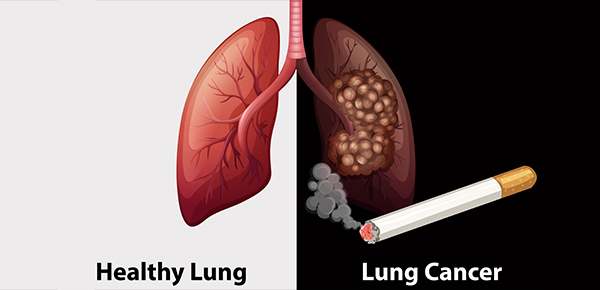There are several causes of lung cancer. Most of these causes relate to the use of tobacco. Smoking is the cause of lung cancer for about 85% of lung cancer cases in the United States. Cigarette smoking, cigar and pipe smoking, environmental tobacco smoke (ETS) or passive smoking, asbestos exposure, air pollution, other lung diseases, diet, and personal history are all risk factors for lung cancer.
Smoking cigarettes causes lung cancer. The chance that a smoker will develop lung cancer is affected by how young the smoker was when he started smoking, how long the person has smoked, and the number of cigarettes smoked per day. Smoking and lung cancer share a distinct relationship. The risk of lung cancer begins to decrease as soon as the smoker stops smoking.
Cigar and pipe smokers also have a high risk of lung cancer providing another link between smoking and lung cancer. Like cigarette smoking, the chance that the smoker will develop cancer depends on age of the smoker when he started smoking, the length of time the person has smoked, and the number of pipes or cigars smoked per day.
ETS or passive smoke, the smoke in the air when someone else smokes, has been accepted as a cause of lung cancer since the Surgeon General’s report of 1986.
Asbestos is a unique cause of lung cancer. Asbestos lung cancer is caused by asbestos fibers that float in the air and stick to clothes. Inhaling the fibers can cause the asbestos to become stuck inside the lungs, damaging cells and increasing the risk for lung cancer. The risk of developing lung cancer through occupational exposure to asbestos is 3 to 4 times greater than normal. Exposure to asbestos will result in an estimated 76,000 deaths from asbestos lung cancer for the 25-year period stretching from 1985 to 2009.
There is a link between air pollution and lung cancer. However, more research is needed to identify the causes. It is estimated that up to 12,000 cancer deaths are caused annually through occupational and everyday exposure to pollutants.
Tuberculosis and other lung diseases increase the chance of developing lung cancer. Lung cancer tends to develop in areas that are injured or scarred from lung diseases.
A large body of statistical evidence supports the role of diet in modifying risk for lung cancer. A diet rich in fruit and vegetables reduces the incidence of lung cancer by approximately 25%. Supplementation with vitamins A, C and E and beta-carotene offers no protection against the development of lung cancer. On the contrary, beta-carotene supplementation has, in two major clinical trials, resulted in an increased death rate. Diet changes the incidence of lung cancer by only a minor degree.
An increased risk associated with the family history of lung and other cancers, independent of smoking habits, suggests the presence of genetic factors as a cause of lung cancer.



